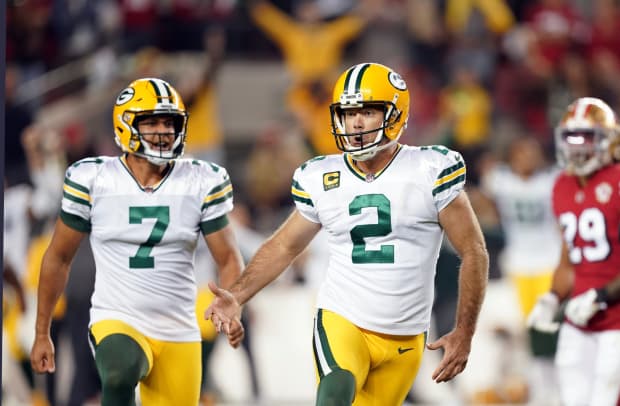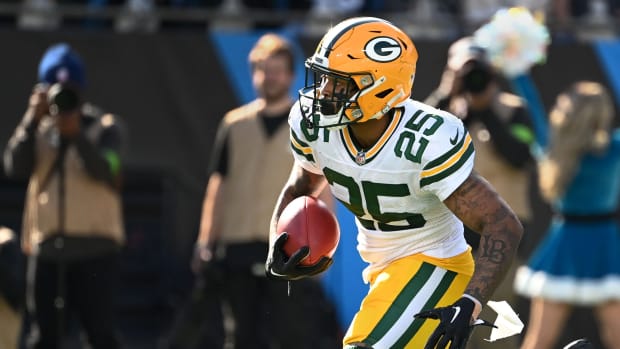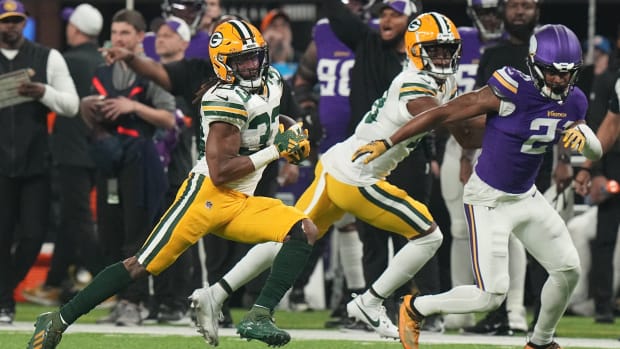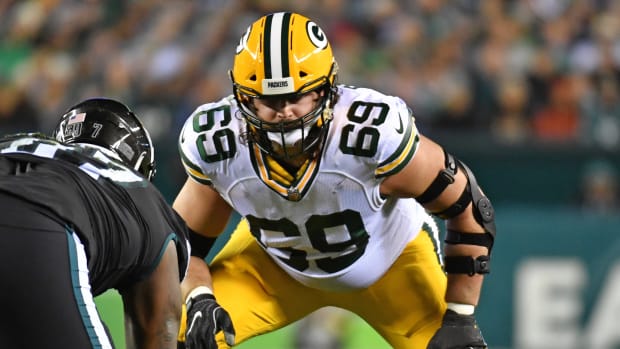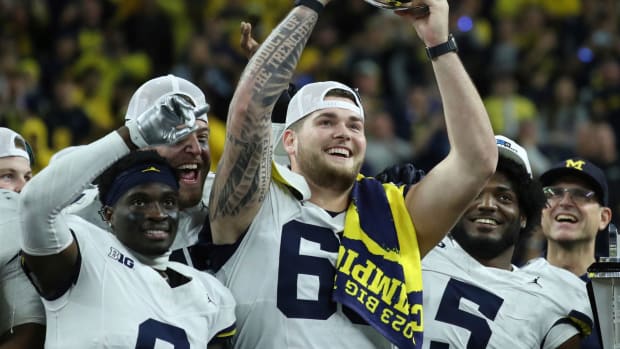Week 3 Report Card: Green Bay Packers at San Francisco 49ers
GREEN BAY, Wis. – It’s only one game, but there’s a world of difference between being 1-2 after losing to a top NFC contender for the second time this season and 2-1 after rallying on the road against a rival.
The Green Bay Packers improved to 2-1 with a 30-28 victory over the San Francisco 49ers on Sunday night. The Packers started fast and took the 49ers’ best shot before delivering a last-play knockout.
“Yeah, it gives some legitimacy to some of the things we’ve been talking about: That that was kind of an aberration [in Week 1 against New Orleans] and that we are a talented football team,” Rodgers said after leading the winning drive.
Here is our Week 3 report card.
Passing offense: Rodgers was masterful beyond the box score, though that was pretty good, too: 23-of-33 passing for 261 yards and two touchdowns, good for a 113.3 passer rating. Two of the incompletions were clock-killing spikes on the winning drive and a third was a drop.
Beyond the stats, there was Rodgers’ mastery of coach Matt LaFleur’s game plan. Other than midway through the fourth quarter, when Rodgers threw three consecutive deep balls, he seemed inclined to take whatever the 49ers were giving him. Then there’s Rodgers’ mastery of the offense, in general, which came into play on the 25-yard completion to Davante Adams that jump-started the winning drive. That play was created by Rodgers on the practice field.
“I like to adjust some routes from time to time. I get a look at what it feels like against our defense, and so I just adjusted one of the routes and we all liked it,” Rodgers said. “And Matty suggested it right before we went out. He said, ‘What do you think about this play?’ I said, ‘Yeah, I like that. I think that’d be pretty good.’”
Of Rodgers’ totals, 12 of the 23 completions, 18 of the 31 targets and 132 of the 261 passing yards were to Adams. But he did hit deep shots to Allen Lazard and Marquez Valdes-Scantling, and Scantling added a touchdown. Adams and tight end Robert Tonyan forced the only missed tackles. Of the 93 yards after the catch, 79 came in the first half.
Given the inexperience of fill-in left tackle Yosh Nijman (first career start), left guard Jon Runyan (second), center Josh Myers (third) and right guard Royce Newman (third), the pass protection was exquisite. Yes, LaFleur provided help to his blockers but they also won their one-on-ones. On the 47-yard pass to Marquez Valdes-Scantling in the first half, Rodgers had all day to throw the ball thanks to quick chips by the tight ends and the work of the five linemen after the tight ends went into the route. Grade: A.
Rushing offense: Aaron Jones didn’t score four touchdowns and he didn’t top 100 yards, but this was his best game of the season. He carried 19 times for 82 yards and one touchdown and added two receptions for 14 yards. Nothing spectacular about that. But Jones was tough and explosive against a fast, physical defense. By our unofficial count, Jones had 53 yards after contact on his runs and broke four tackles – doubling his total of missed tackles through the first two games. AJ Dillon mustered 18 yards on six carries. He’s had to do it almost by himself, with 15 of his 18 yards on Sunday and 48 of his 55 yards on the season coming after contact.
The young offensive line got movement. The Packers had zero runs of 10-plus yards in the first two games but four on Sunday. At this point, LaFleur has more trust in Rodgers. Of the 13 third-down plays, every one was a pass. Grade: B-minus.
Passing defense: Much like last week against Detroit, it was a tale of two halves. In the first half, Jimmy Garoppolo was 10-of-18 passing for 91 yards with one interception, good for a passer rating of 46.3. In the second half, he was 15-of-22 passing for 166 yards and two touchdowns, good for a passer rating of 118.8.
For the third consecutive game, the Packers had no answers for the opposing tight end. This week, it was George Kittle catching seven passes for 92 yards. Most of that came after the catch as he broke four tackles. It was an interesting night for star cornerback Jaire Alexander, who made an otherworldly interception, gave up an easy touchdown and couldn’t prevent a third-down completion to Deebo Samuel on the Niners’ go-ahead drive despite having his hand between Samuel’s hands. Eric Stokes gave up only two catches but was flagged twice for pass interference on third downs. The way-too-early guess is the Packers are going to have a dynamic duo of corners for a long with Alexander and Stokes. Back in the lineup with Kevin King sick, Chandon Sullivan has had better days in the slot.
The pass rush was exceptional. The Packers had four sacks and, according to the official stats, 11 quarterback hits. They had a total of nine hits the first two games. Preston Smith had three hits, and Rashan Gary and Jonathan Garvin had two apiece. According to Pro Football Focus, Kenny Clark had six pressures and Gary and Smith had four each. Clark, by the way, is tied for third among interior defenders with 12 pressures. Grade: C.
Rushing defense: Yes, the 49ers were down to their third running back, rookie Trey Sermon, but he was running behind a strong offensive line that featured four first-round picks. For the night, the Packers limited them to 21 carries for 67 yards. Sermon’s 16-yard gain was the lone explosive run of the night.
Taking quarterback runs out of the equation: In the first six quarters of the season, the Packers allowed 140 yards on 35 carries (4.0 average); in the last six quarters, they allowed 68 yards on 22 carries (3.1 average). Tyler Lancaster and Preston Smith, in particular, were excellent against the run, and Dean Lowry had a third-down stop. Grade: B-plus.
Special teams: Mason Crosby made all three field-goal attempts, including a 54-yarder to open the scoring and a 51-yarder to win the game. Punter Corey Bojorquez was outstanding again, with a 54.7-yard average and, most importantly, a 47.0-yard net average.
Crosby kicked off six times, resulting in three touchbacks and the Niners starting inside the 20 twice. The exception, of course, was Trenton Cannon’s 68-yard return late in the first half that helped get the Niners back in the game. Crosby had the tackle. Rookie returners Kylin Hill and Amari Rodgers didn’t do much with their only opportunity. Grade: B-minus.
Coaching: What a job by LaFleur and his staff in crafting a winning game plan for an offense with four first-year starters on the line facing a defensive line with four first-round draft picks. And what a job by LaFleur and Co. in continually finding ways for Adams to get open.
Defensively Barry’s unit wasn’t great but this isn’t your father’s NFL. Giving up four scoring drives while forcing two turnovers will win most games. Improvement must be made in the red zone, where the Niners scored four touchdowns in four trips inside the 20. But the run defense has tightened and the pass rush has improved. Now, it’s up the players in the secondary to fill in the gaps. A scout who watched the game said that should come as Stokes gains experience and the rest of the players get more comfortable with what Barry’s asking of them and Barry gets a better feel for his players. Grade: B-plus.
